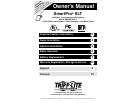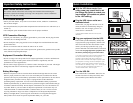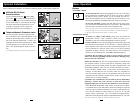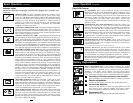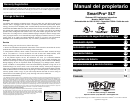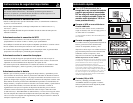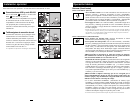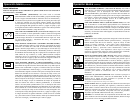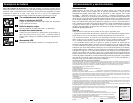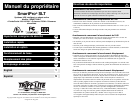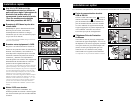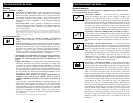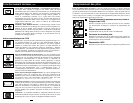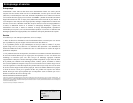
2 3
Important Safety Instructions
SAVE THESE INSTRUCTIONS
This manual contains instructions and warnings that should be followed during the
installation, operation and storage of all Tripp Lite UPS Systems. Failure to heed these
warnings will void your warranty.
UPS Location Warnings
• Install your UPS indoors, away from excess moisture or heat, conductive contaminants,
dust or direct sunlight.
• For best performance, keep the indoor temperature between between 32º F and 104º F (0º C
and 40º C).
• Leave adequate space around all sides of the UPS for proper ventilation.
UPS Connection Warnings
• Connect your UPS directly to a properly grounded AC power outlet. Do not plug the UPS
into itself; this will damage the UPS.
• Do not modify the UPS's plug, and do not use an adapter that would eliminate the UPS’s
ground connection.
• Do not use extension cords to connect the UPS to an AC outlet.
• If the UPS receives power from a motor-powered AC generator, the generator must provide
clean, filtered, computer-grade output.
Equipment Connection Warnings
• Do not use Tripp Lite UPS Systems for life-support applications in which a malfunction or
failure of an Tripp Lite UPS System could cause failure or significantly alter the
performance of a life-support device.
• Do not connect surge suppressors or extension cords to the output of your UPS. This might
damage the UPS and will void the surge suppressor and UPS warranties.
Battery Warnings
• Batteries can present a risk of electrical shock and burn from high short-circuit current.
Observe proper precautions. There are no user-serviceable parts inside the UPS. Do not
open the UPS except to perform battery replacement. Do not open batteries. Do not short or
bridge the battery terminals with any object. Unplug and turn off the UPS before
performing battery replacement. Use tools with insulated handles. Battery replacement
should be performed only by authorized service personnel using the same number and type
of batteries (Sealed Lead-Acid). Do not dispose of the batteries in a fire. The batteries are
recyclable. Refer to your local codes for disposal requirements or in the USA only call
1-800-SAV-LEAD or 1-800-8-BATTERY (1-800-822-8837) or visit www.rbrc.com for
recycling information. Tripp Lite offers a complete line of UPS System Replacement
Battery Cartridges (R.B.C.).Visit Tripp Lite on the Web at www.tripplite.com/support/
battery/index.cfm to locate the specific replacement battery for your UPS.
Quick Installation
With the UPS disconnected from
utility power, use a small tool to set
the Voltage Dip Switch to match your
input voltage. (All models are preset
to the 120V setting.)
Plug the UPS into an outlet on a
dedicated circuit.
NOTE! after you plug the UPS into a live AC
outlet, the UPS will automatically charge its
batteries,* but will not supply power to its
outlets until it is turned ON.
* The BATTERY CHARGE LED will be the only LED
illuminated
Plug your equipment into the UPS.
Select outlets provide both battery backup and
surge protection; plug computers, monitors and
other critical devices into these outlets.* Select
outlets provide surge protection only; plug
printers and other non-essential devices into these
outlets. Do not plug high-draw equipment into
the battery backup/surge protection outlets.
* Your UPS is designed to support electronic equipment only.
You will overload the UPS if the total VA rating for all
equipment connected through the battery backup/surge
protection outlets exceeds the UPS's Output Capacity. To find
your equipment's VA ratings, look on their nameplates. If the
equipment is listed in amps, multiply the number of amps by
120 to determine VA. (Example: 1 amp × 120 = 120 VA). If you
are unsure if you have overloaded the UPS's outlets, see
“OUTPUT LOAD LEVEL” LED description.
Turn the UPS ON.
Press and hold the “STANDBY” button for one
second. The alarm will beep once briefly after
one second has passed. Release the button.
1
2
3
4
1
2
3
4



